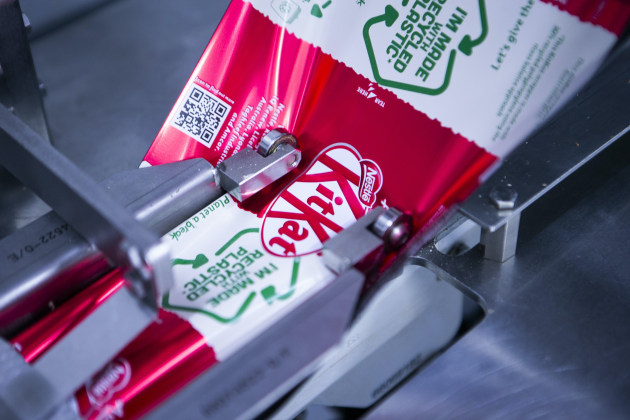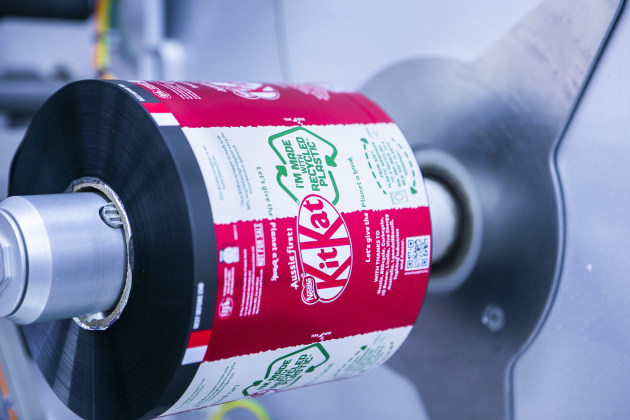A coalition of companies with a shared vision to close the loop on soft plastics have produced the country’s first ever soft plastic food wrapper made with recycled content for the Kit Kat brand of chocolate bars.
Food grade recycled soft plastic packaging is a key missing link in Australia’s bid to improve waste management and build a circular economy, and the prototype Kit Kat wrapper represents Australia’s opportunity to close the loop on recycling soft plastics.
The coalition of companies consists of Nestle, CurbCycle, iQ Renew, Licella, Viva Energy Australia, LyondellBasell, REDcycle, Taghleef Industries and Amcor – all of whom brought their individual expertise to the table for the prototype’s creation.
Turning soft plastic back into oil is currently the only path plastic waste can take if it is to be transformed into a food safe wrapper. Unfortunately, this is technology that Australia does not have yet at scale.
“Between us, we have shown that there’s a pathway to solve the soft plastics problem,” said Sandra Martinez, CEO of Nestle Australia.
“To build this at scale, across all states and territories, across hundreds of councils, is going to take a huge effort from government at all levels, from industry and from consumers.
“Manufacturers like Nestle will have a key role in driving demand for food grade recycled soft plastic packaging, and creating market conditions that will ensure all stakeholders throughout the value chain view soft plastics as a resource and not waste.”

The initiative emerged from a trial underway on the NSW Central Coast, where Australian Recycler iQ Renew and Nestle are working together on a trial of kerbside collection of soft plastics.
These collected plastics, together with plastics collected via REDcycle supermarket soft plastic collection, formed the starting point for the project.
To date, soft plastics collected in Australia have been made into products like outdoor furniture, added to road base or used in waste to energy.
“To improve the recycling rate of soft plastics, kerbside collection is an important point of convenience,” explains Danial Gallagher, CEO of iQ Renew.
“In the trial, soft plastics are collected from kerbside recycling bins in a dedicated bright yellow bag, then sorted from the recycling stream at our MRF.
“To create the Kit Kat wrapper with 30 per cent recycled content, the soft plastics were processed, then sent to Licella for conversion back into the oil from which they originally came. This oil was then used to produce new food grade soft plastics.”

According to Tanya Barden, CEO of the Australian Food and Grocery Council (AFGC), learnings from the Central Coast trial will be informative as the AFGC works to develop an extended producer responsibility scheme for hard to recycle plastics, funded by a National Product Stewardship Investment Fund grant.
“Among other things, we’ll be looking at how this model can be scaled up, ensuring there is healthy demand for packaging with recycled content and helping bring to life local industries that can unlock billions of dollars of value that’s currently lost to landfill,” Barden continues.
On 19 March, Nestle will host leaders from across the plastic packaging value chain for a roundtable event, The Wrap on Soft Plastics, exploring the opportunities and hurdles for soft plastics recycling.

Source
https://www.packagingnews.com.au/latest/kit-kat-prototypes-recycled-soft-plastic-wrapper











